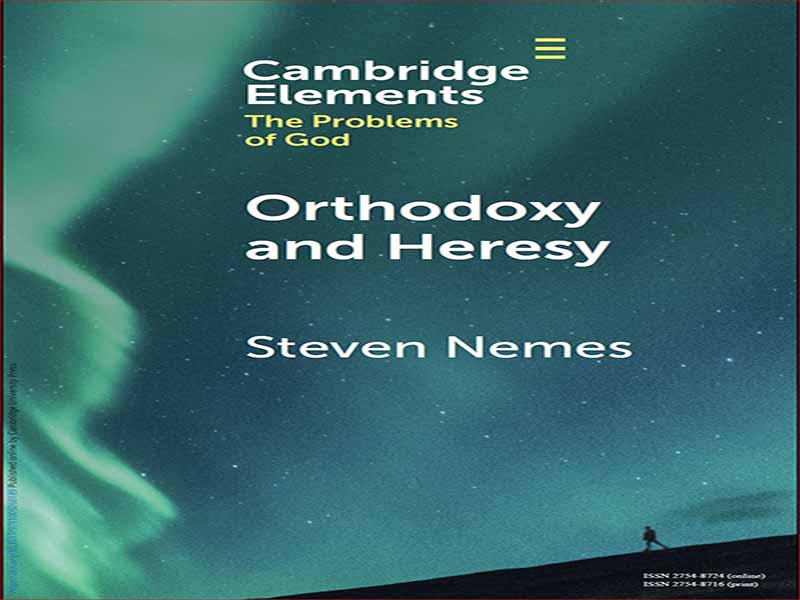- عنوان کتاب: ORTHODOXY AND HERESY
- نویسنده: Michael L. Peterson
- حوزه: مسیحیت
- سال انتشار: 2022
- تعداد صفحه: 72
- زبان اصلی: انگلیسی
- نوع فایل: pdf
- حجم فایل: 11.3 مگابایت
دغدغه این بخش ارائه تحلیلی رسمی از مفاهیم ارتدکس و بدعت است. بحث با در نظر گرفتن معانی احتمالی این اصطلاحات در ارتباط با یکدیگر با توجه به ریشه یونانی آنها آغاز می شود. سپس این مفاهیم در چارچوب وسیعتری از شیوههای ارتباط با چیزهایی قرار میگیرند که تشکیلدهنده زندگی مسیحی هستند، یعنی اعتقاد به آن، اعتقاد به و زندگی با آن. بحث با طرح این پرسش از حقیقت و اینکه ارتدکس و بدعت چه ربطی به داشتن آن دارد خاتمه می یابد. این سؤال در بخشهای 2 تا 4 در پسزمینه باقی میماند و بار دیگر در بخش 5 مطرح میشود. واژههای «ارتدوکس» و «بدعت» هر دو ریشه یونانی دارند. در نظر گرفتن ریشه شناسی مربوط به آنها کمک می کند تا معانی احتمالی آنها و روابطی که بین آنها حاصل می شود آشکار شود (لیدل و اسکات 1996: 41، 444، 1249). “ارتدوکس” از کلمه یونانی orthodoxia گرفته شده است که خود ترکیبی از دو اصطلاح است: orthos و doxa. Orthos صفتی است که به معنای راست یا راست است. با تعمیم، به معنای درست، امن، درست یا صحیح است. در این مفهوم گسترده است که ارتز به یک اصطلاح ارزیابی کننده با مفهومی مثبت تبدیل می شود. گفتن اینکه چیزی ارتز است به این معناست که بگوییم به نحوی خوب یا درست است. Doxa دارای دو معنای اصلی است که برای اهداف فعلی مورد توجه است. در زمینههای معمولاً هلنی، میتواند به معنای نظر، تصور یا قضاوت باشد. دوکسا در این معنا به نگرش اتخاذ شده نسبت به یک گزاره اشاره دارد. به عبارت دیگر، دوکسا می تواند به نگرش گزاره ای یا هرمنوتیکی نسبت به چیزی اشاره کند. داشتن دوکسا به این معنا به این معناست که فکر کنیم یا بگوییم که چیزی فلان کیفیت یا ماهیت دارد. با این حال، در زمینه های عبری، بیشتر به معنای شکوه یا شکوه است. به این معنا، این اصطلاح به تجلی تحمیلی یک چیز در تجربه اشاره دارد. این معنی در Exod است. 16:10 LXX، که می گوید «جلال خداوند» (hē doxa Kuriou) هارون را در ابری پوشانده است. مت. 4: 8 به همین ترتیب بیان میکند که چگونه مسیح در طول وسوسههایش به مکانی بلند برده میشود که از آنجا میتواند همه پادشاهیهای زمین و «شکوه آنها» را ببیند (tēn doxan autōn). دوکسای یک چیز، قدرتی است که با آن خود را در تجربه تحمیل می کند. این دوگانگی معانی دوکسا بر حسب زمینه، در مورد فعل مرتبط doxazō نیز صدق می کند. در زمینههای هلنی، این میتواند به تفکر، تصور، فرض یا داشتن عقیده اشاره داشته باشد. در متن عبری، به ویژه به معنای بزرگ کردن یا بزرگ کردن است. بنابراین در Exod. 15:2 LXX عبرانیان پس از آزادی از مصر می سرایند: “او خدای من است و من او را تمجید خواهم کرد.” پولس به همین ترتیب در روم می نویسد. 1:21 که غیریهودیان بت پرست خدا را به عنوان خدا پرستش نکردند (اوه hōs theon edoxasan). و یوحنا 7:39 تأیید می کند که روح القدس «بود» در حالی که عیسی هنوز تجلیل نشده بود (Iēsous oudepō edoxasthē). بنابراین، ارتدوکسی را می توان حداقل در دو معنا، بسته به تفسیر دوکسا، در نظر گرفت. اگر کسی معنایی را که در زمینههای یونانی رایجتر است انتخاب کند، ارتدوکسی به باور درست یا درست اشاره میکند. ارسطو بدون استفاده از اصطلاح دقیق در اخلاق نیکوماخوس VI، 9 به این ایده اشاره می کند، وقتی می نویسد که حقیقت یا alētheia doxēs orthotēs است: «صحت عقیده» (1142b11). از سوی دیگر، اگر کسی دوکسا را به تعالی یا بزرگنمایی تعبیر کند، ارتدوکسی به پرستش صحیح خدا اشاره دارد. و اگر کسی داشتن اعتقادات صحیح را به عنوان عنصر تشکیل دهنده عبادت در نظر بگیرد، آنگاه دو حس ارتدوکسی با هم ترکیب می شوند.
The concern of this section is to propose a formal analysis of the concepts of orthodoxy and heresy. The discussion begins with a consideration of the possible meanings of these terms in relation to each other according to their Greek etymology. Then these concepts are situated within the wider framework of the ways of relating to things that are constitutive of Christian life as such, namely belief-that, belief-in, and living-with. The discussion terminates by raising the question of truth and of what orthodoxy and heresy have to do with possessing it. This question remains in the background in Sections 2–4 and is brought to the fore once more in Section 5. The words “orthodoxy” and “heresy” are both of Greek origin. A consideration of their respective etymologies helps reveal their possible meanings and the relations that obtain between them (Liddell and Scott 1996: 41, 444, 1249). “Orthodoxy” comes from the Greek word orthodoxia, which is itself a compound of two terms: orthos and doxa. Orthos is an adjective that means straight or upright. By extension, it means right, safe, true, or correct. It is in this extended sense that orthos becomes an evaluative term with a positive connotation. To say that something is orthos is to say that it is somehow good or right. Doxa has two principal meanings that are of concern for present purposes. In typically Hellenic contexts, it can mean opinion, notion, or judgment. Doxa in this sense refers to an attitude taken toward a proposition. Alternatively phrased, doxa can refer to the propositional or hermeneutic attitude taken toward something. To have a doxa in this sense is to think or say that something is of such and such a quality or nature. In Hebraic contexts, however, it more commonly denotes glory or splendor. In this sense, the term refers to the imposing manifestation of a thing in experience. This is the meaning in Exod. 16:10 LXX, which says that the “glory of the Lord” (hē doxa Kuriou) covered Aaron in a cloud. Matt. 4:8 likewise recounts how Christ is taken during His temptations to a high place from which He can see all the kingdoms of the earth and “their splendor” (tēn doxan autōn). The doxa of a thing would be the power with which it imposes itself in experience. This duality of meanings of doxa according to context also applies to the related verb doxazō. In Hellenic contexts, this can refer to thinking, imagining, supposing, or holding an opinion. In the Hebraic context, it especially means to magnify or extol. Thus in Exod. 15:2 LXX the Hebrews sing after their liberation from Egypt: “He is my God, and I will extol (doxasō) Him.” In the same way, Paul writes in Rom. 1:21 that the idolatrous Gentiles did not worship God as God (ouch hōs theon edoxasan). And John 7:39 affirms that the Holy Spirit “was not” while Jesus was not yet glorified (Iēsous oudepō edoxasthē). Orthodoxia thus can be taken in at least two senses, depending on the interpretation of doxa. If one opts for the meaning more prevalent in Hellenic contexts, orthodoxia comes to refer to right or proper belief. Aristotle refers to this idea without using the precise term in Nicomachean Ethics VI, 9, when he writes that truth or alētheia is doxēs orthotēs: “correctness of opinion” (1142b11). On the other hand, if one interprets doxa as exaltation or magnification, then orthodoxia refers to proper worship of God. And if one considers holding proper beliefs as a constituent element of worship, then the two senses of orthodoxia blend together.
این کتاب را میتوانید از لینک زیر بصورت رایگان دانلود کنید:
Download: ORTHODOXY AND HERESY



































نظرات کاربران